中国的环境污染【英文】
2019年以中国的环境污染为话题的初中英语作文
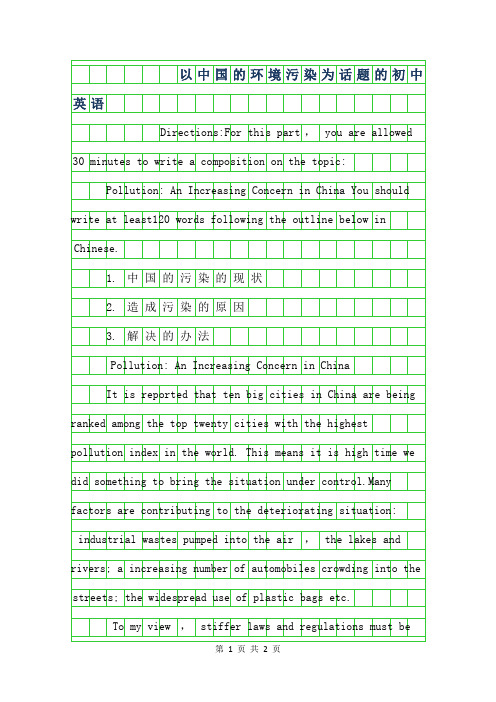
1. 中国的污染的现状
2. 造成污染的原因
3.பைடு நூலகம்解决的办法
Pollution: An Increasing Concern in China
It is reported that ten big cities in China are being ranked among the top twenty cities with the highest pollution index in the world. This means it is high time we did something to bring the situation under control.Many factors are contributing to the deteriorating situation: industrial wastes pumped into the air, the lakes and rivers; a increasing number of automobiles crowding into the streets; the widespread use of plastic bags etc.
环境污染用英语怎么说
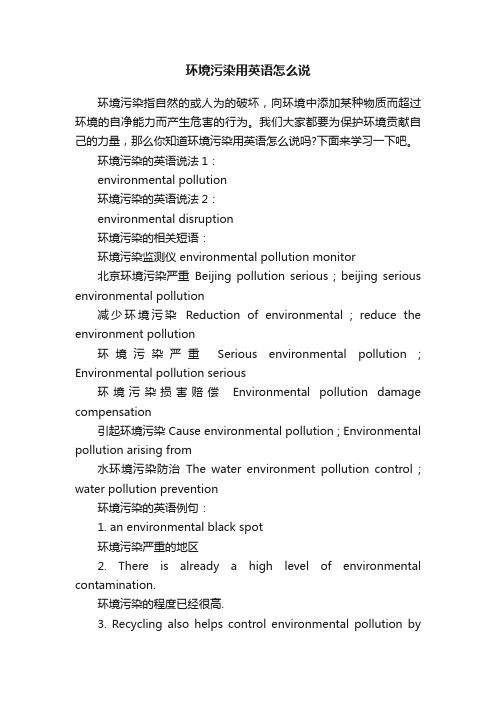
环境污染用英语怎么说环境污染指自然的或人为的破坏,向环境中添加某种物质而超过环境的自净能力而产生危害的行为。
我们大家都要为保护环境贡献自己的力量,那么你知道环境污染用英语怎么说吗?下面来学习一下吧。
环境污染的英语说法1:environmental pollution环境污染的英语说法2:environmental disruption环境污染的相关短语:环境污染监测仪 environmental pollution monitor北京环境污染严重Beijing pollution serious ; beijing serious environmental pollution减少环境污染Reduction of environmental ; reduce the environment pollution环境污染严重Serious environmental pollution ; Environmental pollution serious环境污染损害赔偿Environmental pollution damage compensation引起环境污染 Cause environmental pollution ; Environmental pollution arising from水环境污染防治The water environment pollution control ; water pollution prevention环境污染的英语例句:1. an environmental black spot环境污染严重的地区2. There is already a high level of environmental contamination.环境污染的程度已经很高.3. Recycling also helps control environmental pollution byreducing the need for waste dumps.对废弃物的回收利用能够减少对垃圾场的需求,从而也有助于控制环境污染。
中国最严重环境问题英语作文
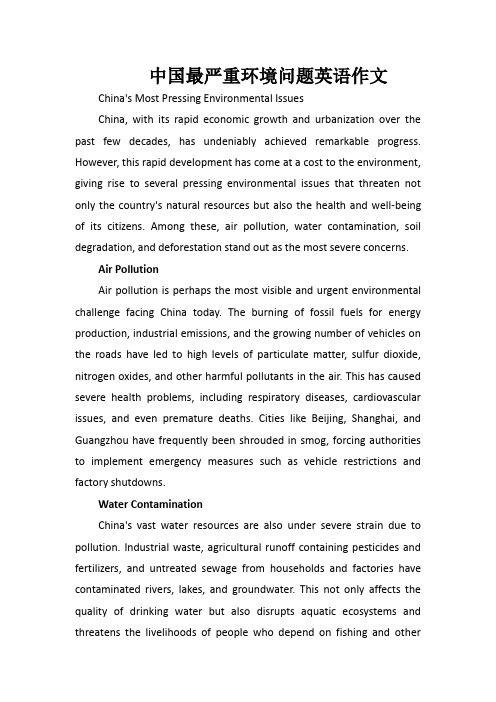
中国最严重环境问题英语作文China's Most Pressing Environmental IssuesChina, with its rapid economic growth and urbanization over the past few decades, has undeniably achieved remarkable progress. However, this rapid development has come at a cost to the environment, giving rise to several pressing environmental issues that threaten not only the country's natural resources but also the health and well-being of its citizens. Among these, air pollution, water contamination, soil degradation, and deforestation stand out as the most severe concerns.Air PollutionAir pollution is perhaps the most visible and urgent environmental challenge facing China today. The burning of fossil fuels for energy production, industrial emissions, and the growing number of vehicles on the roads have led to high levels of particulate matter, sulfur dioxide, nitrogen oxides, and other harmful pollutants in the air. This has caused severe health problems, including respiratory diseases, cardiovascular issues, and even premature deaths. Cities like Beijing, Shanghai, and Guangzhou have frequently been shrouded in smog, forcing authorities to implement emergency measures such as vehicle restrictions and factory shutdowns.Water ContaminationChina's vast water resources are also under severe strain due to pollution. Industrial waste, agricultural runoff containing pesticides and fertilizers, and untreated sewage from households and factories have contaminated rivers, lakes, and groundwater. This not only affects the quality of drinking water but also disrupts aquatic ecosystems and threatens the livelihoods of people who depend on fishing and otherwater-related activities. The problem is particularly acute in regions with high population densities and intense industrial activities.Soil DegradationSoil degradation, caused by overexploitation, erosion, and pollution, is another major environmental concern in China. Intensive farming practices, including the overuse of chemical fertilizers and pesticides, have depleted soil nutrients and harmed soil structure. This has led to decreased crop yields and increased vulnerability to natural disasters like droughts and floods. Moreover, soil pollution from industrial waste and mining activities poses a long-term threat to food safety and human health.DeforestationDeforestation, driven by timber harvesting, agricultural expansion, and urbanization, has significantly reduced China's forest cover. Forests are vital for maintaining ecological balance, regulating climate, and providing habitats for wildlife. Their loss has contributed to soil erosion, reduced water quality, and loss of biodiversity. Additionally, deforestation exacerbates the problem of air pollution by reducing the capacity of trees to absorb carbon dioxide and other greenhouse gases.Addressing the ChallengesRecognizing the severity of these environmental issues, the Chinese government has taken steps to address them. Policies aimed at reducing air pollution, improving water quality, restoring degraded soil, and protecting forests have been implemented. These include stricter environmental regulations, investments in clean energy technologies, and public awareness campaigns. However, much more needs to be done, and it will require the concerted efforts of the government,businesses, and individuals to ensure a sustainable future for China and its people.In conclusion, China faces significant environmental challenges that require immediate and sustained action. By addressing issues such as air pollution, water contamination, soil degradation, and deforestation, China can not only protect its natural resources but also ensure a healthier and more prosperous future for its citizens.。
中国现在最严重的环境问题英语作文开头
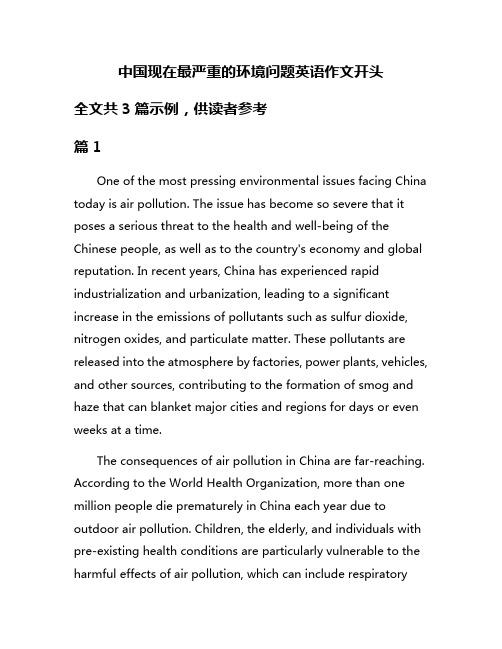
中国现在最严重的环境问题英语作文开头全文共3篇示例,供读者参考篇1One of the most pressing environmental issues facing China today is air pollution. The issue has become so severe that it poses a serious threat to the health and well-being of the Chinese people, as well as to the country's economy and global reputation. In recent years, China has experienced rapid industrialization and urbanization, leading to a significant increase in the emissions of pollutants such as sulfur dioxide, nitrogen oxides, and particulate matter. These pollutants are released into the atmosphere by factories, power plants, vehicles, and other sources, contributing to the formation of smog and haze that can blanket major cities and regions for days or even weeks at a time.The consequences of air pollution in China are far-reaching. According to the World Health Organization, more than one million people die prematurely in China each year due to outdoor air pollution. Children, the elderly, and individuals with pre-existing health conditions are particularly vulnerable to the harmful effects of air pollution, which can include respiratorydiseases, heart problems, and even cancer. In addition to its health impacts, air pollution also has economic costs, as it can reduce labor productivity, increase healthcare expenses, and damage crops and ecosystems.Despite the severity of the problem, efforts to address air pollution in China have been met with mixed results. The Chinese government has implemented a number of policies and initiatives aimed at reducing emissions and improving air quality, such as setting targets for pollution control, promoting cleaner technologies, and establishing emission standards for vehicles and industries. However, enforcement of these measures has been inconsistent, and many regions continue to struggle with high levels of pollution. In addition, China's reliance on coal for energy production remains a major obstacle to reducing air pollution, as coal combustion is a leading source of pollutants and greenhouse gases.In order to effectively tackle the issue of air pollution in China, a comprehensive and coordinated approach is needed. This includes strengthening regulations and enforcement mechanisms, investing in cleaner technologies and renewable energy sources, promoting public awareness and participation, and collaborating with international partners to addresstransboundary pollution issues. By taking decisive action to improve air quality, China can protect the health of its citizens, safeguard its natural environment, and demonstrate its commitment to sustainable development on the global stage.篇2One of the most pressing environmental issues facing China today is air pollution. With the rapid industrialization and urbanization of the country, the level of air pollution has soared to dangerous levels, posing serious health risks to the population and causing harm to the environment.The main source of air pollution in China is the burning of fossil fuels for energy production, transportation, and heating. This releases a high amount of pollutants such as particulate matter, sulfur dioxide, nitrogen oxides, and volatile organic compounds into the air, leading to the formation of smog and haze that blankets many cities in China.The health impacts of air pollution are significant, with studies linking it to respiratory diseases, cardiovascular diseases, and even premature death. Children, the elderly, and individuals with pre-existing health conditions are particularly vulnerable to the effects of air pollution.In addition to the health risks, air pollution also has detrimental effects on the environment. It contributes to acid rain, which damages forests, freshwater ecosystems, and buildings. It also accelerates the process of climate change by increasing the concentration of greenhouse gases in the atmosphere.To address the issue of air pollution, the Chinese government has introduced various measures such as setting air quality standards, implementing emission control policies, and promoting renewable energy sources. However, more efforts are needed to curb the worsening air pollution problem in China and protect the health of its citizens and the environment.篇3One of the most serious environmental issues in China today is air pollution. With the rapid industrialization and urbanization that the country has undergone in recent decades, the levels of pollutants in the air have reached dangerously high levels. The effects of air pollution are widespread and far-reaching, posing a serious threat to both public health and the environment.In major cities like Beijing, Shanghai, and Guangzhou, the air quality often exceeds safe levels, leading to a range of healthproblems such as respiratory diseases, cardiovascular diseases, and even premature death. The smog that blankets these cities is not only unsightly, but also contains a toxic mix of pollutants that can have serious health consequences for the people living there.One of the primary sources of air pollution in China is the burning of coal for energy production. Coal-fired power plants and industrial facilities release large amounts of sulfur dioxide, nitrogen oxides, and particulate matter into the air, contributing to the formation of harmful smog. In addition, the widespread use of cars and trucks also adds to the problem, as vehicles emit pollutants such as nitrogen oxides and volatile organic compounds.The Chinese government has recognized the severity of the air pollution problem and has taken steps to address it. In recent years, stricter regulations have been put in place to limit the emissions of pollutants from industrial sources and vehicles. The government has also invested in renewable energy sources such as wind and solar power in an effort to reduce reliance on coal.Despite these efforts, air pollution remains a major challenge for China. In order to effectively tackle this issue, a comprehensive approach is needed that addresses not only thesources of pollution, but also factors such as urban planning, transportation, and waste management. By taking bold and decisive action, China can work towards cleaner air for all its citizens and a healthier environment for future generations.。
中国污染日益严重英语作文
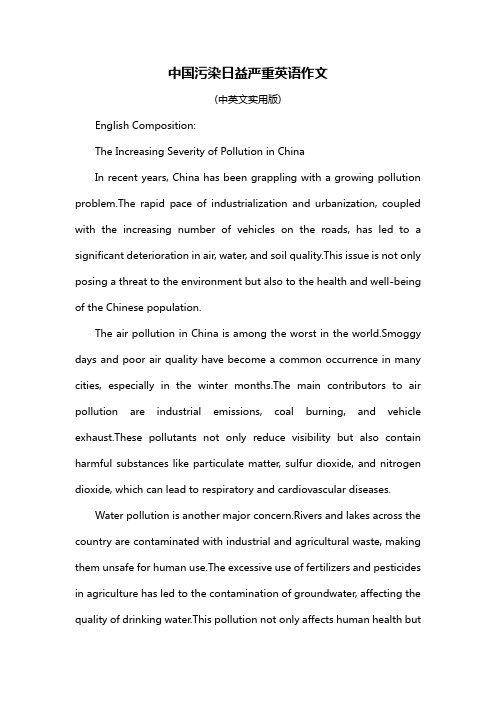
中国污染日益严重英语作文(中英文实用版)English Composition:The Increasing Severity of Pollution in ChinaIn recent years, China has been grappling with a growing pollution problem.The rapid pace of industrialization and urbanization, coupled with the increasing number of vehicles on the roads, has led to a significant deterioration in air, water, and soil quality.This issue is not only posing a threat to the environment but also to the health and well-being of the Chinese population.The air pollution in China is among the worst in the world.Smoggy days and poor air quality have become a common occurrence in many cities, especially in the winter months.The main contributors to air pollution are industrial emissions, coal burning, and vehicle exhaust.These pollutants not only reduce visibility but also contain harmful substances like particulate matter, sulfur dioxide, and nitrogen dioxide, which can lead to respiratory and cardiovascular diseases.Water pollution is another major concern.Rivers and lakes across the country are contaminated with industrial and agricultural waste, making them unsafe for human use.The excessive use of fertilizers and pesticides in agriculture has led to the contamination of groundwater, affecting the quality of drinking water.This pollution not only affects human health butalso disrupts aquatic ecosystems and biodiversity.Soil pollution is equally alarming, with industrial waste and heavy metals contaminating the soil.This poses a serious threat to food safety, as these pollutants can enter the food chain through crops grown in contaminated soil.The long-term exposure to polluted soil can also lead to various health issues in humans.The Chinese government is aware of the severity of the pollution problem and has taken several measures to address it.Strict regulations have been implemented to control industrial emissions, and there has been a push towards renewable energy sources.The government has also invested in improving public transportation and promoting the use of electric vehicles to reduce air pollution.Efforts to combat water pollution include the treatment of industrial and domestic wastewater, as well as the restoration of polluted rivers and lakes.The government is also promoting sustainable agricultural practices to reduce the use of chemical fertilizers and pesticides.However, addressing the pollution issue requires a collective effort from both the government and the public.People need to be more environmentally conscious and adopt sustainable habits in their daily lives.This includes reducing energy consumption, using public transportation, and properly disposing of waste.In conclusion, the increasing severity of pollution in China is apressing issue that requires immediate attention and collective action.The government"s efforts to combat pollution are a step in the right direction, but the active participation of the public is crucial for achieving long-term sustainable development and a healthier environment for future generations.中文作文:中国污染日益严重近年来,我国面临着日益严重的污染问题。
中国的污染现状 英语作文

中国的污染现状英语作文China's Pollution Status。
China, as the most populous country in the world, has been facing severe pollution problems for decades. The rapid economic growth and industrialization have brought about a series of environmental problems, such as air pollution, water pollution, and soil pollution. The pollution problem in China is not only a domestic issue but also a global concern. In this essay, I will discuss the current pollution status in China and its impacts on the country and the world.Air pollution is one of the most serious environmental problems in China. The main sources of air pollution are industrial emissions, vehicle exhaust, and coal-fired power plants. The air pollution has caused serious health problems for the Chinese people, such as respiratory diseases, lung cancer, and heart problems. The smog in many Chinese cities has become a daily occurrence, and thevisibility is often less than 500 meters. The air pollution has also caused a negative impact on China's tourism industry, as many tourists are reluctant to visit China due to the poor air quality.Water pollution is another major environmental problem in China. The sources of water pollution are mainly industrial wastewater, agricultural runoff, and domestic sewage. The polluted water has caused serious health problems for the Chinese people, such as gastrointestinal diseases, hepatitis, and cancer. The water pollution has also caused a negative impact on China's fishing industry, as many fish have died due to the polluted water.Soil pollution is a relatively new problem in China, but it is becoming increasingly serious. The sources ofsoil pollution are mainly industrial waste, agricultural chemicals, and mining activities. The polluted soil has caused serious health problems for the Chinese people, such as cancer, birth defects, and developmental disorders. The soil pollution has also caused a negative impact on China's agricultural industry, as many crops have been contaminatedby the polluted soil.The pollution problem in China is not only a domestic issue but also a global concern. The air pollution in China has caused a negative impact on the global climate, as the greenhouse gas emissions from China are one of the highest in the world. The water pollution in China has caused a negative impact on the global fishing industry, as manyfish migrate across international waters. The soilpollution in China has caused a negative impact on the global food supply, as many crops are exported to other countries.To address the pollution problem in China, the Chinese government has implemented a series of measures, such as promoting clean energy, improving public transportation, and imposing stricter environmental regulations. However, the pollution problem in China is still far from being solved. The Chinese government needs to continue to take more effective measures to reduce the pollution and protect the environment.In conclusion, the pollution problem in China is a serious issue that needs to be addressed urgently. The air pollution, water pollution, and soil pollution have caused serious health problems for the Chinese people and a negative impact on the country's economy. The pollution problem in China is not only a domestic issue but also a global concern. The Chinese government needs to take more effective measures to reduce the pollution and protect the environment. Only by doing so can China achieve sustainable development and contribute to the global environmental protection.。
中国污染日益严重英语作文
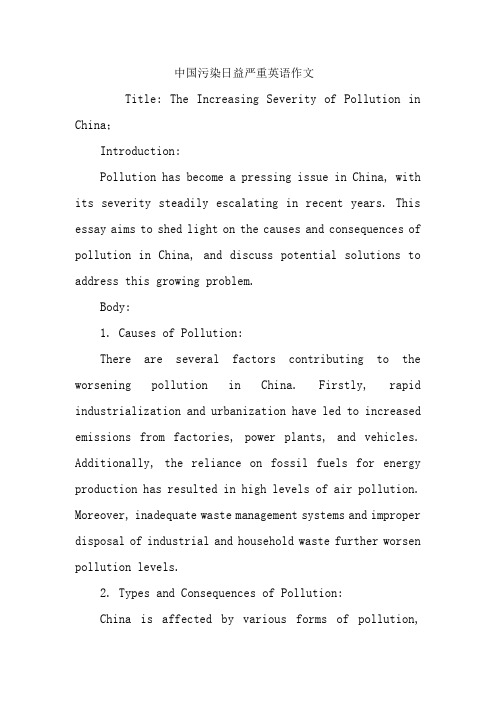
中国污染日益严重英语作文Title: The Increasing Severity of Pollution in China;Introduction:Pollution has become a pressing issue in China, with its severity steadily escalating in recent years. This essay aims to shed light on the causes and consequences of pollution in China, and discuss potential solutions to address this growing problem.Body:1. Causes of Pollution:There are several factors contributing to the worsening pollution in China. Firstly, rapid industrialization and urbanization have led to increased emissions from factories, power plants, and vehicles. Additionally, the reliance on fossil fuels for energy production has resulted in high levels of air pollution. Moreover, inadequate waste management systems and improper disposal of industrial and household waste further worsen pollution levels.2. Types and Consequences of Pollution:China is affected by various forms of pollution,including air pollution, water pollution, and soil contamination. Air pollution, primarily caused by industrial emissions and vehicle exhaust, leads to respiratory problems and other health issues. Water pollution, mainly caused by industrial discharge and agricultural runoff, poses a threat to aquatic ecosystems and human health. Soil contamination due to improper waste disposal and excessive use of pesticides affects agricultural productivity and food safety.3. Environmental and Health Impacts:The impacts of pollution in China are far-reaching. Degraded air quality not only affects public health but also hampers visibility and contributes to global climate change. Water pollution disrupts ecosystems, threatens biodiversity, and limits the availability of safe drinking water. Soil contamination reduces soil fertility, affects crop yields, and can result in the accumulation of toxins in food chains, posing health risks to humans and animals.4. Proposed Solutions:Addressing pollution requires comprehensive and coordinated efforts from the government, industries, and individuals. Some potential solutions include:a) Implementing stricter environmental regulations and enforcing them effectively.b) Encouraging the adoption of cleaner and more sustainable technologies in industries.c) Promoting renewable energy sources to reduce reliance on fossil fuels.d) Enhancing waste management systems and promoting recycling and proper disposal practices.e) Raising public awareness about the importance of environmental protection and encouraging individual actions to reduce pollution.Conclusion:The escalating pollution in China is a significant concern with wide-ranging consequences for both the environment and human health. It is crucial for all stakeholders to come together and take immediate actions to combat pollution. By implementing effective measures and fostering a collective sense of responsibility, we can strive towards a cleaner and healthier environment for present and future generations in China.。
中国的污染日益严重英语作文

中国的污染日益严重英语作文【中英文实用版】The increasing pollution in China has become a pressing issue that cannot be overlooked.The once picturesque landscapes are now shrouded in a haze of industrial emissions, causing a detrimental impact on both the environment and public health.It is high time that we addressed this burgeoning problem with immediate and effective measures.中国的污染问题日益严重,已经到了不容忽视的地步。
曾经如诗如画的景色,如今被工业排放的阴霾所笼罩,对环境和公众健康造成了严重的影响。
是时候采取及时有效的措施来解决这个日益加剧的问题了。
Air pollution, particularly, has reached alarming levels, with smoggy days becoming a regular occurrence in many cities.The toxic blend of fine particulate matter and有害gases poses a significant threat to the respiratory health of millions.It is no longer just an environmental issue; it has become a public health crisis.空气污染尤为严重,许多城市雾霾天气已成为常态。
细颗粒物和有害气体的混合物对数百万人的呼吸健康构成了严重威胁。
- 1、下载文档前请自行甄别文档内容的完整性,平台不提供额外的编辑、内容补充、找答案等附加服务。
- 2、"仅部分预览"的文档,不可在线预览部分如存在完整性等问题,可反馈申请退款(可完整预览的文档不适用该条件!)。
- 3、如文档侵犯您的权益,请联系客服反馈,我们会尽快为您处理(人工客服工作时间:9:00-18:30)。
Health impacts from pollution
• Pollution is killing hundreds of thousands of Chinese people every year. • The pollution is causing people to wear mask’s, and to get very ill. • In Australia people live much longer there the Chinese people because the Australians care about their health and their environment.
China's . pollution
5 interesting facts.
• • • • • The smog is killing many people . China has the biggest population in the world. China invented the cross bow. There are heaps of heritage places in China China is a very religious place.
China’s a beautiful place
• People may not like China because of all the smog but behind all that smog there are some lovely places in China , like • MT Taishan. • MT Taishan is a significant place to the Chinese because a few hundred years a go every emperor use to pray that this BEAUTIFUL place.
How China is trying to reduce the pollution
China is making more improvements over the years. China is trying to increase the forest cover, and reduce the pollution. The pollution is getting better but China is still working on it to make it even better.
China’s environment
What is causing pollution?
• In China smog is becoming a major problem. The Chinese people are cutting down rain forest to build factory’s and houses. • In China it is unbelievable how much electricity is getting wasted, China’s smog is getting worse every single year.
